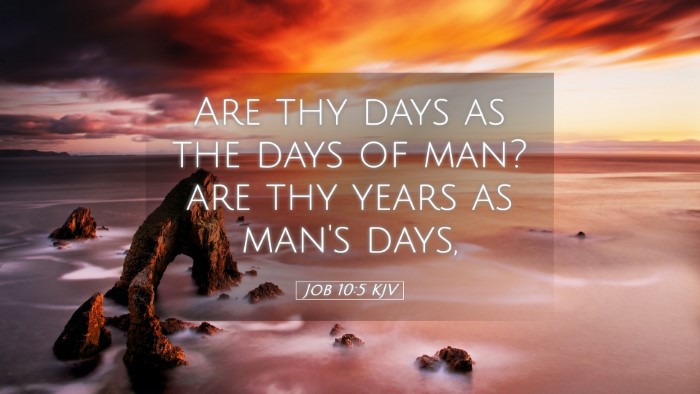Old Testament
Genesis Exodus Leviticus Numbers Deuteronomy Joshua Judges Ruth 1 Samuel 2 Samuel 1 Kings 2 Kings 1 Chronicles 2 Chronicles Ezra Nehemiah Esther Job Psalms Proverbs Ecclesiastes Song of Solomon Isaiah Jeremiah Lamentations Ezekiel Daniel Hosea Joel Amos Obadiah Jonah Micah Nahum Habakkuk Zephaniah Haggai Zechariah MalachiJob 10:5
Job 10:5 KJV
Are thy days as the days of man? are thy years as man's days,
Job 10:5 Bible Commentary
Commentary on Job 10:5
Verse Text: "Are thy days as the days of man? are thy years as man's days?" (Job 10:5, KJV)
This verse presents Job's poignant question to God, reflecting his deep anguish and confusion regarding the nature of divine temporality in contrast to human experience. As such, it serves as a window into the thematic complexities of the Book of Job, particularly concerning human suffering and the mystery of God’s purposes.
Contextual Overview
To comprehend the depth of Job's inquiry in this verse, it is vital to consider the broader context of his dialogue with God. Positioned in the midst of his intense suffering following the tragic loss of his family and possessions, Job grapples with feelings of abandonment and the perceived harshness of divine justice.
Thematic Analysis
- Human Temporal Experience: Job's question underlines the finite nature of human existence. The phrase "the days of man" encapsulates the fleeting, often troubled, lifespan of humanity. Job confronts God, suggesting that He does not share in the same temporal constraints that govern human life.
- Divine Eternity: In juxtaposing God’s eternal nature with man's temporality, Job seems to imply a sense of disconnect. He questions whether God understands human suffering fully, instinctively asserting that God’s experience is vastly different from that of His creation.
Insights from Public Domain Commentaries
Matthew Henry's Commentary
Matthew Henry emphasizes that Job's lament reveals his acute awareness of the disparity between divine existence and human frailty. According to Henry, Job is not questioning God's omnipotence or goodness but rather expressing his struggle with the apparent indifference of God to human suffering.
Henry notes that by asking if God’s days are like man's, Job highlights the eternal attributes of God, which lead to Job’s sense of alienation. His heartfelt inquiry exposes a desire for a relational understanding of suffering—a plea for God to engage with humanity's plight.
Albert Barnes' Notes on the Bible
Albert Barnes interprets Job 10:5 as an exploration of the difference between divine and human realms. He states that Job implies a yearning for divine empathy, underscoring the strain that suffering places on one's relationship with God. Barnes elaborates on the concept that, although God is eternal, He must still comprehend human tribulation to fulfill His role as a benevolent Creator.
Moreover, Barnes characterizes this verse as a vital reflection on the human condition—an acknowledgment of life's brevity and the accompanying sorrow that can lead one to question God's purposes and timing.
Adam Clarke's Commentary
Adam Clarke provides a detailed exegesis of the text, asserting that Job's rhetorical questioning sheds light on the profound anguish he experiences. Clarke argues that the inquiry reveals a deep philosophical tension: the contrast between human perception of time and God's eternal perspective.
Clarke also highlights the psychological dimensions of Job's struggle, suggesting that the despair he voices is relatable to all who face hardship. He notes that Job's questioning is an implicit call for God to acknowledge the pain of mortality, pointing out the universality of suffering and God's role in it.
Theological Reflections
This verse serves as a profound reflection on the nature of God in relation to human suffering—a topic that has intrigued theologians through the ages. Theologically speaking, Job's plea can be understood as an exploration of theodicy, where the coexistence of suffering with an all-good, all-powerful God is analyzed.
Job’s inquiry posits critical questions concerning the nature of God's justice and the human experience of time and suffering. It urges both scholars and practitioners in the faith community to wrestle with the challenges of faith amidst suffering and the importance of seeking understanding within these complexities.
Conclusion
Job 10:5 encapsulates the essence of human anguish and the search for divine understanding in the face of inexplicable suffering. The exploration of this verse through the insights of noted commentators highlights the ongoing theological investigation into the nature of God, human suffering, and the longing for reconciling the two. For pastors, students, and theologians alike, this verse serves as a clarion call to engage deeply with the realities of suffering while fostering an understanding of God’s eternal nature.


